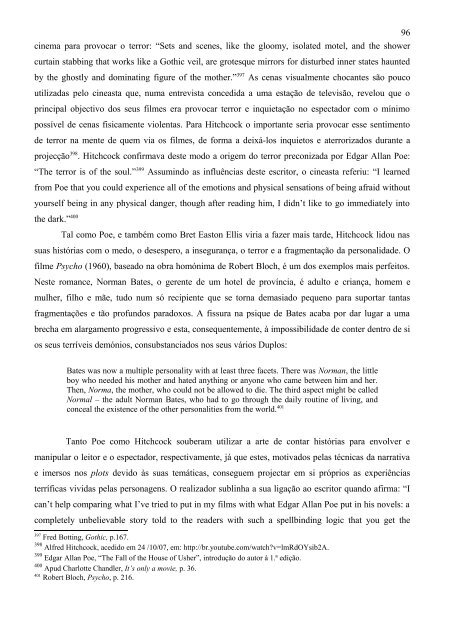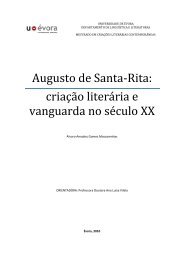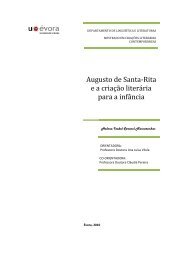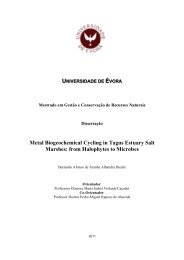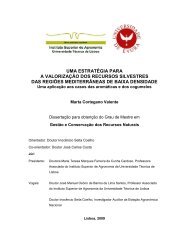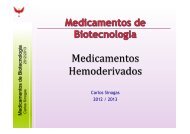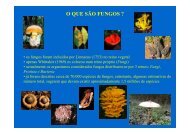João LuÃs Nabo - Index of - Universidade de Évora
João LuÃs Nabo - Index of - Universidade de Évora
João LuÃs Nabo - Index of - Universidade de Évora
Create successful ePaper yourself
Turn your PDF publications into a flip-book with our unique Google optimized e-Paper software.
cinema para provocar o terror: “Sets and scenes, like the gloomy, isolated motel, and the shower<br />
curtain stabbing that works like a Gothic veil, are grotesque mirrors for disturbed inner states haunted<br />
by the ghostly and dominating figure <strong>of</strong> the mother.” 397 As cenas visualmente chocantes são pouco<br />
utilizadas pelo cineasta que, numa entrevista concedida a uma estação <strong>de</strong> televisão, revelou que o<br />
principal objectivo dos seus filmes era provocar terror e inquietação no espectador com o mínimo<br />
possível <strong>de</strong> cenas fisicamente violentas. Para Hitchcock o importante seria provocar esse sentimento<br />
<strong>de</strong> terror na mente <strong>de</strong> quem via os filmes, <strong>de</strong> forma a <strong>de</strong>ixá-los inquietos e aterrorizados durante a<br />
projecção 398 . Hitchcock confirmava <strong>de</strong>ste modo a origem do terror preconizada por Edgar Allan Poe:<br />
“The terror is <strong>of</strong> the soul.” 399 Assumindo as influências <strong>de</strong>ste escritor, o cineasta referiu: “I learned<br />
from Poe that you could experience all <strong>of</strong> the emotions and physical sensations <strong>of</strong> being afraid without<br />
yourself being in any physical danger, though after reading him, I didn’t like to go immediately into<br />
the dark.” 400<br />
Tal como Poe, e também como Bret Easton Ellis viria a fazer mais tar<strong>de</strong>, Hitchcock lidou nas<br />
suas histórias com o medo, o <strong>de</strong>sespero, a insegurança, o terror e a fragmentação da personalida<strong>de</strong>. O<br />
filme Psycho (1960), baseado na obra homónima <strong>de</strong> Robert Bloch, é um dos exemplos mais perfeitos.<br />
Neste romance, Norman Bates, o gerente <strong>de</strong> um hotel <strong>de</strong> província, é adulto e criança, homem e<br />
mulher, filho e mãe, tudo num só recipiente que se torna <strong>de</strong>masiado pequeno para suportar tantas<br />
fragmentações e tão pr<strong>of</strong>undos paradoxos. A fissura na psique <strong>de</strong> Bates acaba por dar lugar a uma<br />
brecha em alargamento progressivo e esta, consequentemente, à impossibilida<strong>de</strong> <strong>de</strong> conter <strong>de</strong>ntro <strong>de</strong> si<br />
os seus terríveis <strong>de</strong>mónios, consubstanciados nos seus vários Duplos:<br />
Bates was now a multiple personality with at least three facets. There was Norman, the little<br />
boy who nee<strong>de</strong>d his mother and hated anything or anyone who came between him and her.<br />
Then, Norma, the mother, who could not be allowed to die. The third aspect might be called<br />
Normal – the adult Norman Bates, who had to go through the daily routine <strong>of</strong> living, and<br />
conceal the existence <strong>of</strong> the other personalities from the world. 401<br />
Tanto Poe como Hitchcock souberam utilizar a arte <strong>de</strong> contar histórias para envolver e<br />
manipular o leitor e o espectador, respectivamente, já que estes, motivados pelas técnicas da narrativa<br />
e imersos nos plots <strong>de</strong>vido às suas temáticas, conseguem projectar em si próprios as experiências<br />
terríficas vividas pelas personagens. O realizador sublinha a sua ligação ao escritor quando afirma: “I<br />
can’t help comparing what I’ve tried to put in my films with what Edgar Allan Poe put in his novels: a<br />
completely unbelievable story told to the rea<strong>de</strong>rs with such a spellbinding logic that you get the<br />
397 Fred Botting, Gothic, p.167.<br />
398 Alfred Hitchcock, acedido em 24 /10/07, em: http://br.youtube.com/watch?v=lmRdOYsib2A.<br />
399 Edgar Allan Poe, “The Fall <strong>of</strong> the House <strong>of</strong> Usher”, introdução do autor à 1.ª edição.<br />
400 Apud Charlotte Chandler, It’s only a movie, p. 36.<br />
401 Robert Bloch, Psycho, p. 216.<br />
96


